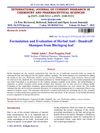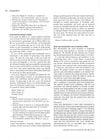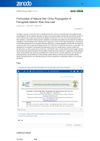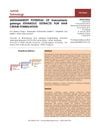 19 citations,
May 2021 in “Clinical, Cosmetic and Investigational Dermatology”
19 citations,
May 2021 in “Clinical, Cosmetic and Investigational Dermatology” Minoxidil and finasteride are the best for non-scarring hair loss; more research is needed for scarring hair loss treatments.
 4 citations,
October 2022 in “Genes”
4 citations,
October 2022 in “Genes” Our microbiome may affect the development of the hair loss condition Alopecia Areata, but more research is needed to understand this relationship.
 3 citations,
August 2021 in “The Open Dermatology Journal”
3 citations,
August 2021 in “The Open Dermatology Journal” The herbal hair serum improves hair quality and growth, and is a good alternative to traditional cosmetics because it doesn't contain harmful chemicals like parabens and sulphates.
 1 citations,
January 2023 in “Revista Da Associacao Medica Brasileira”
1 citations,
January 2023 in “Revista Da Associacao Medica Brasileira” People with seborrheic dermatitis often have lower vitamin D levels.
 1 citations,
July 2017 in “Clinical research in dermatology”
1 citations,
July 2017 in “Clinical research in dermatology” Hair loss, known as Androgenetic Alopecia, is often caused by hormones and can be diagnosed using noninvasive techniques. Treatments include topical minoxidil and oral finasteride, with new treatments being explored. There may also be a link between this type of hair loss and heart disease risk.
 258 citations,
July 2016 in “Reproductive Biology and Endocrinology”
258 citations,
July 2016 in “Reproductive Biology and Endocrinology” The document concludes that insulin resistance is key in PCOS development and early treatment is crucial to prevent complications.
 2 citations,
January 2019 in “Annals of Dermatology”
2 citations,
January 2019 in “Annals of Dermatology” Melandrium firmum extract helps mice grow hair by blocking a hair loss enzyme and changing hair growth genes.
 January 2019 in “International Journal of Herbal Medicine”
January 2019 in “International Journal of Herbal Medicine” The polyherbal emulgel created for hair care was safe, had good qualities, and could lead to future hair care products.
 98 citations,
May 2008 in “Archives of Dermatological Research”
98 citations,
May 2008 in “Archives of Dermatological Research” Eclipta alba extract helps hair grow faster and more effectively than minoxidil in rats.
 67 citations,
May 2007 in “Journal of Cosmetic Dermatology”
67 citations,
May 2007 in “Journal of Cosmetic Dermatology” The herbal formulation promoted hair growth faster and more effectively than minoxidil in rats.
 51 citations,
March 2006 in “Bioorganic & Medicinal Chemistry”
51 citations,
March 2006 in “Bioorganic & Medicinal Chemistry” Newly made nicotinamide compounds could potentially treat cancer.
 7 citations,
January 2010 in “Pharmacognosy Research”
7 citations,
January 2010 in “Pharmacognosy Research” The tobacco leaf extract may help hair grow and could treat hair loss.
 2 citations,
June 2022 in “Molecules”
2 citations,
June 2022 in “Molecules” Connarus semidecandrus Jack extract promotes hair growth and thickness, reduces prostate cancer cell growth, and could potentially be used as a treatment for hair loss.
 1 citations,
October 2022 in “Annals of Translational Medicine”
1 citations,
October 2022 in “Annals of Translational Medicine” Cucurbitacin helps mice grow hair by blocking a protein that stops hair growth.
 32 citations,
November 2005 in “Journal of Investigative Dermatology Symposium Proceedings”
32 citations,
November 2005 in “Journal of Investigative Dermatology Symposium Proceedings” Most women preferred the 1% pyrithione zinc shampoo for better hair smoothness and less frizz while controlling dandruff.
12 citations,
May 2017 in “Journal of pharmaceutical and biomedical analysis” The method shows that zinc pyrithione and climbazole from anti-dandruff shampoo effectively reach the scalp.
 February 2023 in “Deleted Journal”
February 2023 in “Deleted Journal” The herbal shampoo effectively cleans hair and removes dandruff without causing side effects.

Coconut oil and turmeric were almost as good as 2% ketoconazole shampoo for treating dandruff.
 April 2024 in “International Research Journal Of Modernization In Engineering Technology And Science”
April 2024 in “International Research Journal Of Modernization In Engineering Technology And Science” Herbal shampoos are effective, non-toxic alternatives for treating dandruff and hair fall.
 February 2023 in “International Journal of Advanced Research in Science, Communication and Technology”
February 2023 in “International Journal of Advanced Research in Science, Communication and Technology” Herbal shampoos with Neem and Tulsi might be safer and more effective for controlling dandruff.
 January 2023 in “International Journal of Research Publication and Reviews”
January 2023 in “International Journal of Research Publication and Reviews” Some herbal ingredients like linalool and tea tree oil have anti-dandruff properties and are safe for use in shampoos.
12 citations,
October 1981 in “International Journal of Cosmetic Science” Effective anti-dandruff products work well against scalp microbes and stick to the skin.
 July 2023 in “International journal of current research in chemistry and pharmaceutical sciences”
July 2023 in “International journal of current research in chemistry and pharmaceutical sciences” The shampoo made with Bhringraj leaf and other natural ingredients shows promise as a natural dandruff solution.
 15 citations,
March 1997 in “International Journal of Dermatology”
15 citations,
March 1997 in “International Journal of Dermatology” Selenium sulfide in anti-dandruff shampoos can turn hair green.
3 citations,
September 2021 in “BioEssays” Dandruff might be caused by changes in how hair follicles naturally release oils and an immune response to this imbalance.
2 citations,
January 2013 in “Journal of cosmetics, dermatological sciences and applications” Using a special shampoo and scalp tonic together can greatly reduce severe dandruff and its causes.
 January 2024 in “Zenodo (CERN European Organization for Nuclear Research)”
January 2024 in “Zenodo (CERN European Organization for Nuclear Research)” The natural hair oil made from fenugreek seeds and aloe vera showed good hair growth, minimal side effects, and effective anti-dandruff and anti-fungal properties.
 October 2020 in “Journal of bio innovation”
October 2020 in “Journal of bio innovation” DanEraTM hair tonic effectively treats dandruff and hair fall using natural ingredients.
24 citations,
November 2015 in “International Journal of Cosmetic Science” Treating scalp issues with anti-dandruff shampoo improves hair health.
 4 citations,
February 2018 in “Jurnal teknologi”
4 citations,
February 2018 in “Jurnal teknologi” Kaempferia galanga extract could be a good ingredient for anti-dandruff hair cream.

























